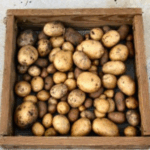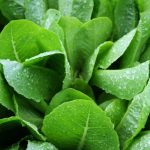This is the time of year when your local nursery and garden center, home improvement store and grocery store trots out the garden seeds. Catalogs arrive in the mail selling every type of garden seeds imaginable. What is the different among the different garden seeds advertised? Which is best for your garden?
[Tweet “Grow a great garden from garden seeds this year. Learn how to choose your garden seeds.”]
Choosing Garden Seeds
Many home gardeners start their gardens from seeds. Garden seeds offer many advantages. Not only are they economical (300 seeds for $1.29? Yes, please!), they’re convenient. Root crops such as carrots, beets, turnips and parsnips should only be started from seeds sown directly into the garden soil where you intend to grow your vegetables.
I like to grow most of my vegetables and flowers from garden seeds because of the varieties I can grow. I love to experiment with different tomato varieties, for example, choosing different heirloom and heritage varieties each year to see which ones taste the best and to add variety to my meals. The different tastes, colors, and textures among such common vegetables like tomatoes and fruits like cantaloupes will astonish you when you grow them from seed. Last year, I grew “Vine Peach” cantaloupes in containers on my back deck. I could have lived on cantaloupe during the summer, it was that good! Much better than anything you’d buy in the store, but I never would have discovered the unique, perfume-like qualities of the cantaloupe if I didn’t buy the seeds.
But when you’re starting a new garden, or you’re new to gardening or planting seeds, the different seed companies, packages and products can be absolutely overwhelming. I still feel overwhelmed sometimes as I flip through the pages of my favorite gardening catalogs or stand in front of the displays at Lowe’s or Home Depot. It can be challenging to sort through all the different types of garden seeds.
I’ve put together this simple list so that you can decide for yourself which types of garden seeds to purchase for your garden. I grow all different kinds of seeds, including some conventional, some organic, and some heirloom. You have to find the right mix for your needs, garden and lifestyle.
Types of Garden Seeds
Some gardeners may classify garden seeds differently. The following are the categories I use to identify the types of garden seeds.
- Conventional: Conventional garden seeds are the least expensive seeds you can buy. The packages won’t say “conventional” on them but will simply be labeled with the type of seeds and growing information. They are easy to find, and perform reliably, germinating well and producing decent fruit, vegetables and flowers. The seeds can be GMO, hybrid, or heirloom. They are simply grown, harvested, collected, packaged and sold without frills.
- Hybrid: Hybridization has been used for centuries by farmers and gardeners to create new varieties of plants. Hybridization isn’t the same as genetically modified (GMO) plants. Hybridization uses nature’s method of pollination. People select the traits they wish to cultivate in a plant and choose parent plants, acting like the bees by pollinating the flowers themselves to ensure that their genetic selection results in the new seeds and plants. There’s nothing wrong with hybrid plants or seeds, and they often provide important characteristics such as disease resistance to their offspring. New varieties are often created through hybridization, such as taller plants or different colors. Nature can also create new hybrids, too, but mankind tends to speed up the process of hybridization to produce new garden seeds.
- Heirloom Seeds: The word “heirloom seed” has many definitions, but for most gardeners, heirloom garden seeds refers to seeds from plants that have been under cultivation for more than 50 years. Most heirloom seeds come from non-GMO, open-pollinated sources. These plants have withstood the test of time and produced reliably for decades. I look for heirloom vegetable seeds because I choose to grow my garden using organic methods, and I know that heirlooms were developed during times when pesticides use was infrequent or nonexistent. If a plant could withstand diseases and insects naturally in my great-grandparent’s day, it’s right for my garden. Heirloom vegetable garden seeds often have much greater variety in color, texture and flavor than you can find elsewhere, too.
- GMO or Genetically Modified Seeds: There’s a great deal of controversy surrounding GMO or genetically modified seeds. I haven’t quite made up my mind about them yet. Scientists say they are safe, but many people are skeptical of them. GMO seeds have new genetic material inserted into the genes of the plants to produce seeds with special characteristics. Corn seeds, for example, have been genetically modified so that they can resist herbicide applications. Farmers growing corn have a lot of trouble in my part of the country with a plant called Johnson Grass. When Johnson Grass grows, it looks just like young corn plants, but it can rapidly overtake a cornfield and use up all the nutrients needed to grow corn. Many farmers use herbicides to eradicate it and other weeds. Corn that’s genetically modified to resist herbicides won’t die but the weeds will. Garden seeds that have been genetically modified should be labeled as such in plant catalogs. If you choose to avoid them, shop for seeds from organic or heirloom seed companies.
- Open-Pollinated Seeds: This is a new category I’ve recently seen advertised in seed catalogs, so it bears mentioning. Open-pollinated seeds are simply seeds grown under natural conditions, so that the wind, bees or other pollinating insects or processes pollinate the plants the way nature intended. The resulting seeds are simply seeds that are like seeds you might find in the wild. The benefit of such seeds is that the growing and harvesting of such seeds is very easy on the environment.
- Organic Seeds: Organic seeds must be grown under strict requirements established by the government in order to bear the “Organic” label. The seeds themselves aren’t different from other seeds, but the growing conditions in which they are raised are easier on the environment. Organic farms raising garden seeds do not use pesticides or herbicides, so you can rest easy knowing they haven’t hurt bees or other pollinators as they produced their seeds. The resulting plants from organic seeds are NOT organic plants unless you also incorporate organic gardening practices into your gardening routine.





Yes I am planning today. To many seeds, chili and tomato…
Garden hello from Denmark – Maria
I’m soooo excited to start seed shopping soon! Last year was my first year gardening. I have a major lack of space but was able to have success with my first organic container garden on my porch. 🙂 I’m excited for year 2! Love your blog!
Aw Rachel, thanks for dropping by! A container garden can produce plenty of vegetables and fruit. I grew everything from tomatoes to cantaloupe in a container garden before I moved to Virginia.
We have recently got an allotment and are going to be growing so much of our own things. My son is looking forward to planting his sunflower seeds!! Thank you for linking up with #anythinggoes linky with Blogging Mummy.
How nice of you to stop by! Thanks for leaving a comment. Your son will love growing sunflower seeds. Plant them in a circle and he can have his own natural play “fort” made of sunflowers!
I love planning for my Garden! I just finished ordering all my seed catalogs! Now I just have to wait for Spring! #HomeMattersParty
It is with great joy that I realized I am two months away from my last frost date. Time to start the tomatoes! #HomeMattersParty
Great tips!! Here in the mountains of AZ, I don’t get to start planting until about April. It’s great to plan and be ready, though! #HomeMattersParty